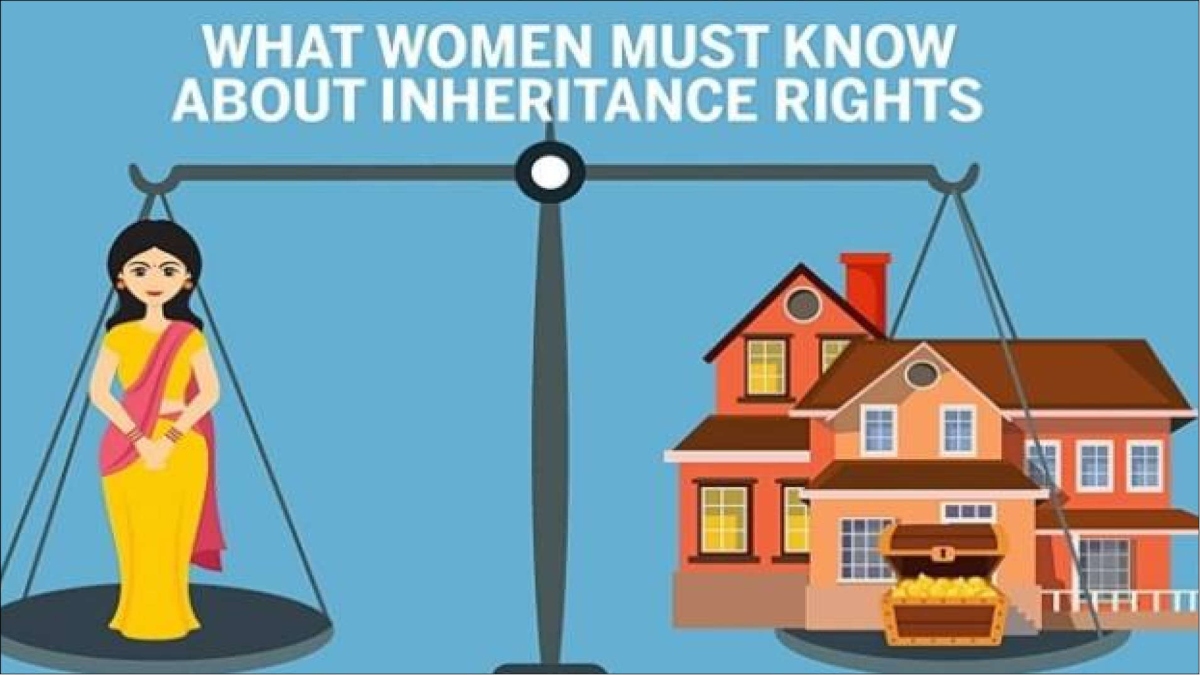


The status of Hindu women had always been subjected to male members of the family even in accordance with the Dharmashastras. So, when the Hindu Succession Act was enacted in 1956; the legislators didn’t actually felt any need for giving equal rights to daughters in the coparcenary property of the father, due to their belief that the daughter will be a part of another family after her marriage and thus should not have right to inherit anything from her father’s property.
‘A son is a son till he gets a wife, but a daughter is a daughter all her life.’ – A three judges bench headed by Justice Arun Kumar Mishra reaffirmed this when a question arose- Whether Hindu Succession (Amendment) Act, which gave equal rights to daughters in ancestral property, have a retrospective effect.

Before 1956 act came into the force, the shastric and customary laws greatly varied from region to region on caste basis that dominantly governed Hindus. But after, 1956 act the ancestral properties were distributed according to survivorship rule where women were not considered as equal coparceners. It was only after the modernization in society and recent precedents were women came forward for their respective rights, amendment was brought to section 6 of 2005 act and this survivorship rule was abrogated and in Prakash vs Phulavati the supreme court held that after 2005 if the father is live then the daughters have every right to claim their benefit in any ancestral properties.
Later, on the same line in 2018 in the matter of Danamma vs Amar Singh, the court contradictory to prakash judgment held that even if the father had died before 2005, yet daughters will get equal share and they are hence, entitled to her father’s property. Further, in 2020 in Vineeta Sharma vs Rakesh Sharma the Supreme Court opined that 2015 judgment was wrong and they declared that father needs not to be alive on the date of enforcement of 2005 amendment.
String of Legislations:
Before the Hindu Succession Act, 1956 Shastric and Customary laws, that varied from region to region, governed the Hindus and sometimes it varied in the same region on a caste basis; this led to diversity in the law. So, there were even different schools founded on different interpretations of Smritis for matters relating to succession such as Mitakshara and Dayabhaga School.
The Hindu Law of Inheritance Act, 1929 was another piece of legislation and the earliest. This was although, the act that brought the woman into the scheme of inheritance. This legislation imposed the rights of inheritance on three female heirs such as son’s daughter, daughter’s daughter, and sister, a limited restriction on the survivorship rule.
The Hindu Succession Act, 1956 is an Act of the Parliament of India that was enacted to amend and codify the law on intestate or unwilled succession among Hindus, Buddhists, Jains, and Sikhs i.e. the Act deals only with intestate succession.
Section 6 of Hindu Succession Act, (before the 2005 Amendment) elucidated “ Devolution of interest in coparcenary property- When a Hindu male dies after the commencement of this Act, having at the time of his death an interest in a Mitakshara coparcenary property, his interest in the property shall devolve by survivorship upon the surviving members of the coparcenary and not in accordance with this Act”.
According to this, no female was a member of the Mitakshara coparcenary property as they were considered of not being a lineal descendant of the coparcener or from the same bloodline. The widows, siblings or any other heirs of the deceased coparceners were not given any right to inherit from the ancestral property, only the lineal descendants of the coparceners through survivorship rule were said to be the coparceners.
After a long-run process of around 50 years, the Centre in 2005 passed the amendment Act to eradicate gender discrimination in coparcenary property. The Pre- 2005 Amendment Act or the Hindu Succession Act, 1956 was discriminatory on the grounds that women were not considered as coparceners to inherit the ancestral property since birth like the sons. A coparcenary property is a property inherited by any Hindu from his father or grandfather or great grandfather. A coparcener is a term used for any person who inherits the ancestral property by birth. This Hindu Succession Act was enacted to codify Hindu Law.
The Central Government raised objection to the idea of giving retrospective operation to the 2005 amendment law because a coparcener in Hindu family law has a right to seek partition. For the said reason, the law fixed a cut-off date of December 20, 2004 to avoid reopening of any settlement or partition decree prior to this date. The court gave acceptance to the 20th December, 2004 (date) as cut-off but focused on the fact that if a daughter seeks partition or a share, the same cannot be denied on the basis of an oral family settlement but on a final decree of a court or a registered family settlement. If an oral settlement is to be presented, the bench held, it has to be supported “by public documents.”
Hindu Succession (Amendment) Act 2005: Section 6
The Hindu Succession (Amendment) Act 2005 is very crucial as it addressed various gender inequalities in the previous act and gave equal rights to daughters in Hindu Mitakshara Coparcenary Property.
CHANGES AFTER THE 2005 AMENDMENT
• The act amended the provision which excluded daughters from coparcenary property.
• Daughter of a coparcener shall birth become a coparcener in the same manner as the son.
• Coparcener property shall be allotted to the daughter as is allotted to sons if a Hindu dies.
• A daughter is entitled to demand a partition of the HUF.
• A daughter is also entitled to dispose off her share in the coparcenary property at her own will.
• If a female coparcener dies before partition, then children of such coparcener would eligible for allotment assuming a partition had taken place immediately before her demise.
CONFUSION OVER APPLICABILITY OF SECTION 6
In the case of Prakash and others v. Phulavati (2016), the apex court opined that “The rights of coparceners under amendment act 2005 are applicable to living daughters of living coparceners as on 9/9/2005 irrespective of the birth date of daughters.” It simply means that If a coparcener(father) had passed away prior to Sept 9, 2005, the living daughter of the coparcener would have no right to coparcenary property in such case.
The Supreme Court in the case of Danamma v. Amar (2018), held that if the father passed away prior to date 09.09.2005 (the date on which amendment came) and a prior suit is pending for partition by a male coparcener, the female coparceners will be entitled to a share (Although same was not entitled in Phulavati’s case).
These two cases created an era of confusion on the interpretation of Section 6 of the Hindu Succession (Amendment) Act 2005.
THE AMENDMENT ACT AIMED AT MAKING 2 MAJOR AMENDMENTS IN HINDU SUCCESSION ACT, 1956
Amended the provision which excluded the right of daughters from coparcenary property.
Omitted Section 3 of the act which disentitled a female heir to ask for partition in respect of a dwelling house which is wholly occupied by a joint family, until the male heirs choose to divide their respective shares.
In the case of Vineeta Sharma v. Rakesh Sharma (2020), the bench the Supreme Court ruled that daughters have an equal right in the parental property the same as the son, even if the father died before the Hindu succession (amendment) act 2005. It also held that the rights under the amendment are applicable to living daughters of living coparceners as on the date 09.09.2005, irrespective of when such daughters are born.
CONCLUSION
Henceforth, according to the recent judgment passed, the 2005 amendment Act has been declared retrospective, and daughters are given equal rights over the ancestral property of their fathers even if the father of the daughter died prior to September 9th, 2005.
The provisions of section 6 have been held to be prospective. The provisions contained in substituted Section 6 of the Hindu Succession Act, 1956 confer status of coparcener on the daughter born before or after amendment in the same manner as son with same rights and liabilities. The rights can be claimed by the daughter born earlier with effect from 9.9.2005 with savings as provided in Section 6(1) as to the disposition or alienation, partition or testamentary disposition which had taken place before 20th day of December, 2004. Since the right in coparcenary is by birth, it is not necessary that father coparcener should be living as on 9.9.2005. The statutory fiction of partition created by proviso to Section 6 of the Hindu Succession Act, 1956 as originally enacted did not bring about the actual partition or disruption of coparcenary. The fiction was only for the purpose of ascertaining share of deceased coparcener when he was survived by a female heir, of Class I as specified in the Schedule to the Act of 1956 or male relative of such female.
The provisions of the substituted Section 6 are required to be given full effect. Notwithstanding that a preliminary decree has been passed the daughters are to be given share in coparcenary equal to that of a son in pending proceedings for final decree or in an appeal. In view of the rigor of provisions of Explanation to Section 6(5) of the Act of 1956, a plea of oral partition cannot be accepted as the statutory recognized mode of partition effected by a deed of partition duly registered under the provisions of the Registration Act, 1908 or effected by a decree of a court. However, in exceptional cases where plea of oral partition is supported by public documents and partition is finally evinced in the same manner as if it had been affected by a decree of a court, it may be accepted. A plea of partition based on oral evidence alone cannot be accepted and to be rejected outrightly.
The Supreme Court also held that the rights under the amendment are applicable to living daughters of living coparceners as on the date 9 September 2005, irrespective of when such daughters are born. Henceforth, according to the recent judgment passed, the 2005 Amendment Act has been declared retrospective, and daughters are given equal rights over the ancestral property of their fathers even if the father of the daughter died prior to 9 September 2005.
The provisions of the substituted Section 6 are required to be given full effect. Notwithstanding that a preliminary decree has been passed the daughters are to be given share in coparcenary equal to that of a son in pending proceedings for final decree or in an appeal. In view of the rigor of provisions of Explanation to Section 6(5) of the Act of 1956, a plea of oral partition cannot be accepted as the statutory recognised mode of partition effected by a deed of partition duly registered under the provisions of the Registration Act, 1908.